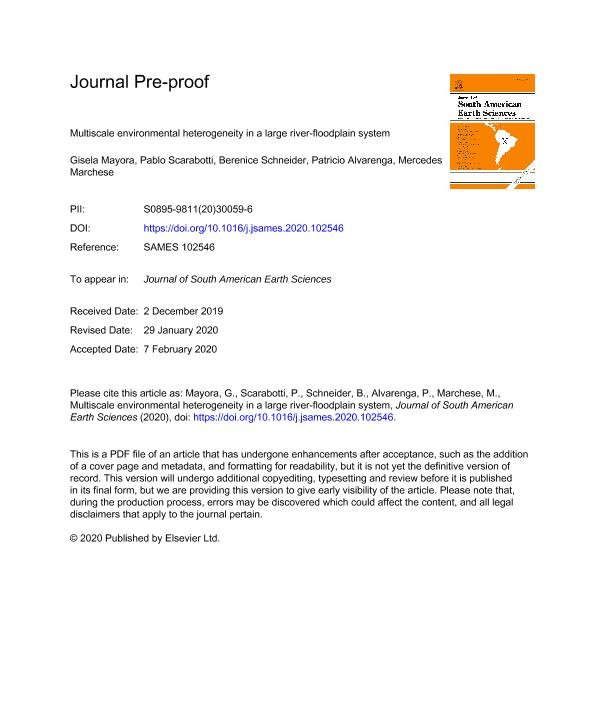Mostrar el registro sencillo del ítem
dc.contributor.author
Mayora, Gisela Paola

dc.contributor.author
Scarabotti, Pablo Augusto

dc.contributor.author
Schneider, Berenice

dc.contributor.author
Alvarenga Mariani, Patricio Francisco

dc.contributor.author
Marchese Garello, Mercedes Rosa

dc.date.available
2022-01-03T16:26:39Z
dc.date.issued
2020-06
dc.identifier.citation
Mayora, Gisela Paola; Scarabotti, Pablo Augusto; Schneider, Berenice; Alvarenga Mariani, Patricio Francisco; Marchese Garello, Mercedes Rosa; Multiscale environmental heterogeneity in a large river-floodplain system; Pergamon-Elsevier Science Ltd; Journal of South American Earth Sciences; 100; 6-2020; 1-10
dc.identifier.issn
0895-9811
dc.identifier.uri
http://hdl.handle.net/11336/149525
dc.description.abstract
River-floodplain systems host very high biodiversity and provide a great variety of ecosystem services due largely to their high environmental heterogeneity, which is strongly dependent on spatial and temporal scales of observation. We aimed to describe the main patterns of environmental variation of the subtropical system of the Middle Paraná River at different scales of analysis using univariate and multivariate statistics. Physical, chemical and biological variables were analyzed during different hydro-sedimentological phases along four consecutive years in 31 aquatic environments. We considered four aquatic habitat types with different degrees of hydrological connectivity and water flow characteristics (major rivers, secondary channels, floodplain lakes permanently connected to the major rivers, and floodplain lakes temporarily connected to the major rivers) from two geomorphologic units with different drainage patterns: anastomosing and meandering. The environmental heterogeneity was mainly associated with the habitat types and relative contributions of lateral tributaries with different water qualities to each unit, in combination with the influence of the hydro-sedimentological regime. The heterogeneity of the system was significantly higher during low water than during high water phases. However, although the extreme flood reduced dissimilarities between habitat types within each geomorphologic unit, it increased differences between major rivers and between units. In conclusion, at different spatial scales, floods may simultaneously have a homogenization effect due to increased hydrological connectivity and a differentiation effect due to enhanced inputs of water from regions with variable geological characteristics and land uses. Finally, geomorphologic units can play a key role in maintaining the environmental heterogeneity during floods of high magnitude, even when land barriers among aquatic environments disappear.
dc.format
application/pdf
dc.language.iso
eng
dc.publisher
Pergamon-Elsevier Science Ltd

dc.rights
info:eu-repo/semantics/openAccess
dc.rights.uri
https://creativecommons.org/licenses/by-nc-nd/2.5/ar/
dc.subject
AQUATIC HABITAT TYPES
dc.subject
GEOMORPHOLOGIC UNITS
dc.subject
HYDRO-SEDIMENTOLOGICAL DYNAMICS
dc.subject
MIDDLE PARANÁ RIVER
dc.subject
SPATIO-TEMPORAL VARIABILITY
dc.subject.classification
Oceanografía, Hidrología, Recursos Hídricos

dc.subject.classification
Ciencias de la Tierra y relacionadas con el Medio Ambiente

dc.subject.classification
CIENCIAS NATURALES Y EXACTAS

dc.title
Multiscale environmental heterogeneity in a large river-floodplain system
dc.type
info:eu-repo/semantics/article
dc.type
info:ar-repo/semantics/artículo
dc.type
info:eu-repo/semantics/publishedVersion
dc.date.updated
2021-08-27T20:29:25Z
dc.journal.volume
100
dc.journal.pagination
1-10
dc.journal.pais
Estados Unidos

dc.description.fil
Fil: Mayora, Gisela Paola. Consejo Nacional de Investigaciones Científicas y Técnicas. Centro Científico Tecnológico Conicet - Santa Fe. Instituto Nacional de Limnología. Universidad Nacional del Litoral. Instituto Nacional de Limnología; Argentina
dc.description.fil
Fil: Scarabotti, Pablo Augusto. Consejo Nacional de Investigaciones Científicas y Técnicas. Centro Científico Tecnológico Conicet - Santa Fe. Instituto Nacional de Limnología. Universidad Nacional del Litoral. Instituto Nacional de Limnología; Argentina
dc.description.fil
Fil: Schneider, Berenice. Consejo Nacional de Investigaciones Científicas y Técnicas. Centro Científico Tecnológico Conicet - Santa Fe. Instituto Nacional de Limnología. Universidad Nacional del Litoral. Instituto Nacional de Limnología; Argentina
dc.description.fil
Fil: Alvarenga Mariani, Patricio Francisco. Consejo Nacional de Investigaciones Científicas y Técnicas. Centro Científico Tecnológico Conicet - Santa Fe. Instituto Nacional de Limnología. Universidad Nacional del Litoral. Instituto Nacional de Limnología; Argentina
dc.description.fil
Fil: Marchese Garello, Mercedes Rosa. Consejo Nacional de Investigaciones Científicas y Técnicas. Centro Científico Tecnológico Conicet - Santa Fe. Instituto Nacional de Limnología. Universidad Nacional del Litoral. Instituto Nacional de Limnología; Argentina
dc.journal.title
Journal of South American Earth Sciences

dc.relation.alternativeid
info:eu-repo/semantics/altIdentifier/url/https://linkinghub.elsevier.com/retrieve/pii/S0895981120300596
dc.relation.alternativeid
info:eu-repo/semantics/altIdentifier/doi/http://dx.doi.org/10.1016/j.jsames.2020.102546
Archivos asociados
